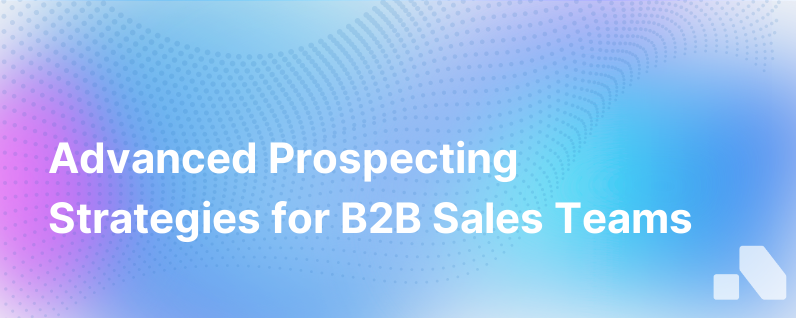
In the realm of B2B sales, where building relationships and understanding client needs take precedence, the traditional hit-and-miss prospecting methods no longer hold water. Today, sales prospecting is an intricate blend of art and science, demanding a more nuanced and technologically savvy approach. B2B sales teams must adopt advanced prospecting strategies to remain competitive and carve out their space in the business landscape.
Exponential Importance of Personalization
Prospecting in the B2B domain has shifted from a generic spray-and-pray approach to a highly targeted and personalized engagement model. Buyers expect sales reps to understand their unique challenges and present solutions that align with their specific pain points. This personal connection is not just about first-name email greetings but also entails providing bespoke insights and content tailored to the prospect’s industry, company size, and market position.
Leveraging Technology and Insights
The contemporary sales toolkit includes CRM platforms, automation tools, social media, predictive analytics, and AI-driven applications. These technologies enable sales teams to pinpoint and reach out to prospects at optimal times, thereby enhancing the prospecting strategy’s effectiveness. Predictive analytics, for instance, churn massive data sets to provide recommendations on the most promising leads, while AI can craft personalized outreach at scale.
Data-Driven Decisions
In the age of information, possessing accurate and comprehensive data is invaluable. The seamless integration of up-to-date prospect data into CRM systems empowers sales representatives to make informed decisions and tailor their sales pitches more effectively. CRM solutions equipped with AI capabilities can further refine lead qualification processes, ensuring that sales efforts are concentrated on the prospects most likely to convert.
Social Selling Mastery
Social selling, particularly through professional networking platforms like LinkedIn, has become a cornerstone of B2B prospecting. Sales teams can build an authoritative voice in their industry by producing and sharing insightful content, contributing to discussions, and connecting with key decision-makers in a non-intrusive manner. The goal is to cultivate a network that recognizes your expertise and trusts your recommendations.
Strategizing Engagement with Content
Inbound marketing techniques have proved to revolutionize the prospecting process. By creating and distributing valuable content – be it whitepapers, case studies, blog posts, or webinars – businesses can draw prospects naturally toward their offerings. Content that addresses common industry issues or showcases expertise serves as a magnet for generating high-quality leads without the hard sell.
Multi-Touch, Omnichannel Prospecting
A sophisticated prospecting strategy recognizes the need for touching prospective clients across multiple channels. Whether it’s through email campaigns, social media interactions, phone calls, or face-to-face meetings, a multi-channel approach ensures that the sales message is received and acted upon. Combining outreach methods effectively keeps the company top-of-mind and allows prospects to engage in the way they prefer.
Sales and Marketing Alignment
Achieving synergy between sales and marketing teams amplifies the impact of prospecting efforts. Sales insights can refine marketing campaigns, while marketing initiatives can generate leads and equip sales with effective tools and content. The two functions working in lockstep allow for a smoother buyer journey and increased chances of conversion.
Continuous Education and Adaptation
The B2B sales landscape is perpetually evolving, with new technologies, methodologies, and buyer preferences continuously emerging. Sales teams must commit to lifelong learning and adaptability, remaining open to new ideas and willing to adjust prospecting strategies accordingly.
Implementing Account-Based Prospecting
Account-based prospecting marks a strategic shift focusing on key accounts that present the highest value or strategic importance. Building multi-threaded relationships within these accounts, understanding the intricacies of their business, and crafting hyper-personalized outreach campaigns resonate strongly within the B2B space.
Inclusion of Aomni
Aomni is a formidable ally in the drive to optimize B2B prospecting strategies. Offering real-time account research, competitive insights, and personalized sales content, the platform streamlines strategic sales efforts. With Aomni, sales teams can bypass the heavy lifting traditionally associated with sales prep, instead embracing a solution where refined information and actionable insights are readily accessible within a mere 15 minutes. No additional effort beyond leveraging the platform's capabilities is needed.
Incorporating such an AI-driven platform as Aomni into the prospecting ecosystem translates directly to increased sales productivity and enhanced conversion rates.
Conclusion
B2B prospecting demands a carefully designed and impeccably executed strategy. The incorporation of advanced tools and methodologies gears sales teams towards success in an increasingly competitive environment. Sales teams must adopt a data-driven, personalized approach, leverage technology, align with marketing efforts, and remain agile in the face of change to see significant improvements in their prospecting outcomes. Utilizing platforms like Aomni can further sharpen the edge that B2B sales teams have in their market and catalyze their revenue generation.
Sources:
- 19 Best Sales Prospecting Tools and Software - Nutshell
- B2B Sales Prospecting Tools: Top 10 Software for 2024 - Lusha
- A Collection of B2B Sales Case Studies | 6sense
- Case Studies | B2B Rocket
- Marketing Best Practices: Learn from These 4 B2B Case Studies
- 5 Key Metrics to Measure the Success of Your B2B Sales Outreach
- 18 Best B2B Sales Prospecting Tools [2024]
- 11 Sales Metrics Every B2B Organization Should Be Tracking